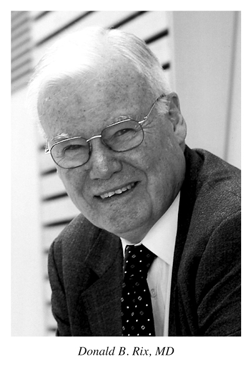Dr Donald B. Rix
1931–2009

Healer, leader, educator, mentor, philanthropist, business leader.
Don was all of the above, but first and foremost he was a physician, both spiritually as well as physically, using his wisdom and life experiences, medical skills, compassion, and philanthropy to help those in need.
Don was born in Orillia, Ontario, and grew up in London, Ontario, where he attended University of Western Ontario and obtained a BA in 1953 and an MD in 1957. He interned at St. Paul’s Hospital in Vancouver and began his medical career as a general practitioner, working with Dr Adam Waldie at his West 10th Avenue clinic in Vancouver in 1958.
Don always had a very active and inquisitive nature and while practising as a GP became fascinated with pathology. He undertook a residency program in pathology at Vancouver General Hospital and received his fellowship in it in 1972.
Leadership is by example, by those who walk the talk. Don was that leader. Whether in the area of family, medicine, business, education, or philanthropy, Don’s commitments were always 100%. When Don was considering donations, he always consulted and included his family in the decisions. However, Don did more than just contribute, he would role up his sleeves and pitch right in, no matter what the cause, and he was a very hard and diligent worker as well.
Don was a great mentor; he would not only provide assistance and advice—be it in business, medicine, or philanthropy—but would also seek mentorship and advice. He was always keen to learn from others. He felt that learning was a lifelong experience and sought to share his knowledge with others. Don was passionate about education, and for many years he taught medical students at UBC. He personally endowed many institutions in BC and elsewhere in Canada.
Don really cared about people. He was always there, ready to help individuals, groups, organizations, and institutions. He was involved with Sunnyhill Hospital Foundation, Children’s Hospital Foundation, and Canucks Place Children’s Hospice.
He was instrumental in the establishment of the BCMA benevolent fund and was the founding contributor. He would personally meet with individuals in need of support and help plan their recovery. When there were not sufficient funds to help individuals, he would personally provide the needed resources.
Even while he was undergoing radiation and chemotherapy he undertook to meet with a young medical student who was in dire need of assistance. Don went to bat for him; made sure he had funds to meet his needs and even dealt with the banks on his behalf.
He was associated with many institutions, including UVic, UBC, UNBC, and UWO, and contributed to many of their programs and initiatives such as expansion of undergraduate medical training and facilities.
Don was extremely active in the BC Medical Association. He was a member of the Board of Directors. He was a district nominator and chaired the Finance Committee for 20 years. In recent years at the BCMA Annual General Meetings he arranged for a trumpet chorus to announce yet another “no dues increase” for the membership. Don was also deputy speaker of the Canadian Medical Association.
Throughout the years, Don’s colleagues and peers honored him with many awards and accolades. He was given the BCMA Silver Medal of Service for outstanding contributions to the medical profession in BC, and this past year received the Canadian Medical Association’s F.N.G. Starr Award for distinguished achievement, the highest award that the CMA can bestow.
Don received honorary doctorates from BCIT, the Justice Institute of BC, SFU, UBC, UNBC, UVic, and UWO. Don received the Order of BC in 2004 and the Order of Canada in 2008. The BCMA Board is now in the process of establishing the Dr Donald Rix Leadership Award.
The last 2 years were difficult for Don and his family; he lost his beloved wife Eleanor in 2007, and shortly after he was diagnosed with cancer. Even though he was undergoing treatment he kept up his community commitments, he chaired the Board of Trade, and initiated the Rix Center for Corporate Citizenship.
In addition to those words above, there is one other to describe Don: hero.
Don is survived by his daughter Laurie and her husband Neil Macrae, and his brother Robert (Bob) Rix and wife Judith.
—Mark Schonfeld, MD
BCMA CEO
